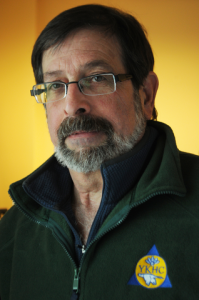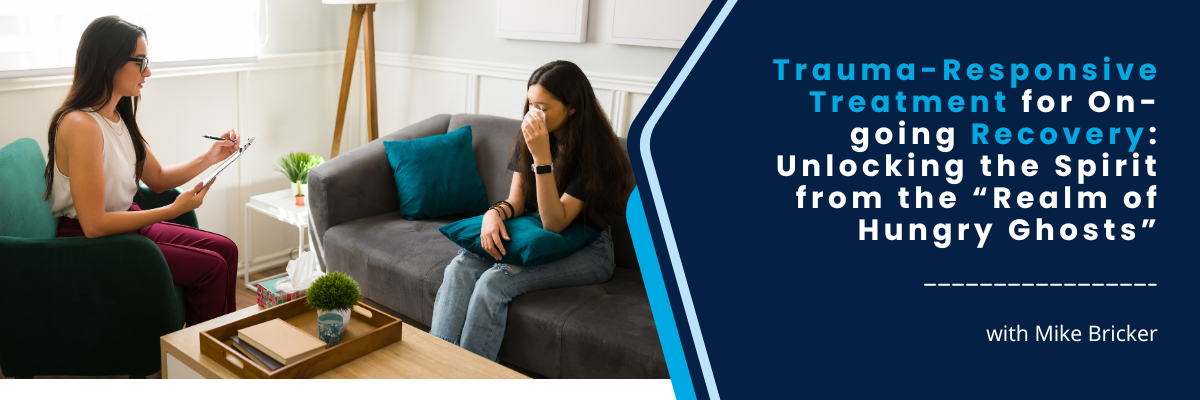
Trauma-Responsive Treatment for On-going Recovery: Unlocking the Spirit from the “Realm of Hungry Ghosts” - March 20, 2025
Includes a Live In-Person Event on 03/20/2025 at 8:30 AM (EDT)
-
You must log in to register
- Learners - $75
A 6-Hour Training with Mike Bricker, MS, CADC-II, NCAC-2, LPC
8:30am-4:00pm
130 Pembroke Road, Suite 150, Concord, NH 03301
Presentation: A 6-hour presentation in 4 parts. Take a moment and think of a difficult client – perhaps a frequent flyer, or chronic relapser. Yep – that's the one. How can you be more helpful in guiding them toward a life worth living? Perhaps by focusing less on the trauma and more on the strength & resilience that helped them live long enough to get to us!
Part 1: When Time Doesn’t Heal All Wounds – Gateway to the Realm
"Don’t ask what the addiction...ask why the PAIN.” Gabor Mate
What treatment interventions might be helpful in dealing with ACEs? Recent research is focused on the hypothesis that repeated trauma somehow resets the baseline of autonomic arousal in the developing central nervous system (ANS). The earlier – and more frequently – this happens, the more robust and long-lasting this ANS hyper-arousal becomes. It’s like having your foot on the gas all the time and working the clutch and brake with your other foot – a rough and bumpy ride that will prematurely wear out your engine, clutch and brake…and probably cause some accidents along the way!
Part 2: When the Past is Always With Us – Adverse Childhood Experiences Addiction as an Attachment Disorder
The Adverse Childhood Experiences survey (ACEs) has been with us for 25 years, has become a standard part of the intake process for many behavioral health clinicians, and at least 10 States have mandated its use for Medicaid. Despite wide acceptance and obvious clinical utility, this workshop suggests that the ACEs Survey – especially used as a stand-alone document – has several major drawbacks, and one serious flaw for clinical assessment. We will describe one way the survey has been adapted to reflect psychosocial development…and celebrate the resilience that helped them to survive long enough to get to us! We present one adaptation of the ACE Survey as a screening instrument which resolves these issues and provide reproducible handouts for clinical use.
Part 3: Shifting the “Pair-adigm”: from “trauma informed” to Trauma-RESPONSIVE Care
When we change our language, we help change THEIR world! In this workshop, we will demonstrate the difference between “trauma-informed” and trauma-responsive treatment for persons with a history of complex trauma, substance abuse and personality disorders. Participants will learn the 5 basic elements of good trauma care, and Evidence-Based Practices designed to implement them in treatment.
Part 4: Flying Starfish, Broken Jars and Puppies in the River: If Surviving Trauma Didn’t Kill You – getting over it isn’t going to!
This interactive presentation explains how we can inspire hope in our patients and support Trauma-responsive treatment. Our clients’ spirit has been shattered by addiction and mental distress, and protective factors against current trauma have proven inadequate. We will describe how to help our patients build upon the strengths revealed in the revised ACE survey. Clinicians can help accelerate psychosocial development…and celebrate the resilience that helped our clients to survive long enough to get to us! Like the ancient Japanese art of Kintsugi, the strengths built in Recovery are like the seams of gold that restore the shattered soul to wholeness. We provide reproducible handouts for clinical use..
As a result of this training, participants will be able to:
- Describe the impact of early trauma on normal brain development, often resulting in complex trauma;
- Discuss how these developmental deficits contribute to the development of Substance Use and MH Disorders;
- Identify a neurological pathway out of trauma and substance use into recovery;
- Describe 3 limitations of the ACE survey in its original form;
- Explain 2 modifications to emphasize psychosocial development and the resilience developed as a result of developmental trauma;
- Verbalize how the impact of childhood abuse, neglect and complex trauma can affect clients’ responsiveness to treatment;
- Address 3 differences between “trauma-informed” and trauma-responsive treatment;
- Have a step-by-step roadmap to transform their approach to help patients respond to past trauma and move ahead toward healing;
- Explain 2 modifications to emphasize psychosocial development and the resilience developed as a result of intergenerational trauma;
- Describe the basic tenets of Trauma-RESPONSIVE treatment; and
- Use both revised ACEs forms in their practice with reproducible handouts provided.
6 Contact Hours Available
CRSW Performance Domains: 3-4
LADC/MLADC Categories of Competence: 4-7 & 11-18
Certified Prevention Specialist Domains: 2 & 5-6
NBCC: LICSW/L-MFT/LCMHC (Category A) & Psychologist (Category A)
NH Alcohol & Drug Abuse Counselors Association has been approved by NBCC as an Approved Continuing Education Provider. ACEP No 6754. Programs that do not qualify for NBCC credit are clearly identified. NHADACA is solely responsible for all aspects of the program.
This training is financed under a contract with the State of NH, Department of Health and Human Services, with funds provided in part by the State of NH and/or such funding sources as were available or required, e.g., the United States Department of Health and Human Services.

Mike Bricker, MS, CADC-II, NCAC-2, LPC
Mike Bricker MS, CADC-II, NCAC-2, LPC a consultant on “dual recovery” from substance use and mental disorders through the STEMSS Institute and specializes in blending research-based treatment with other Wisdom Traditions. Mike is also a Behavioral Health Clinician for LifeStance Behavioral Health in Eugene Oregon, and provides trauma-responsive care for complex trauma, chronic pain, and Medication- Assisted Treatment. He has educated and trained Counselors in Alaska, Oregon & the Navajo Nation. Mike is a seasoned trainer who presents regularly at national conferences, an invited reviewer for SAMHSA grants, and a NAADAC Approved Education Provider. He has been a clinician, consultant and teacher for over 40 years.
The STEMSS® Training Institute provides clinical education, training and consultation to Behavioral Health organizations and clinicians. Specializing in Dual Recovery from MH/SUD disorders, trauma-responsive care, integration with Primary Care and blending western Evidence-Based Practices with other Wisdom Traditions.
